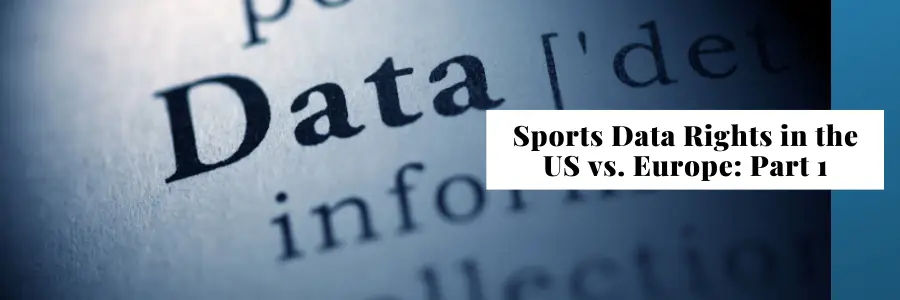‘Settled State’ Part 1: The Sports Data Debate In Europe

Unsurprisingly for a sports-betting market which is far further down the road of regulation, the relationship between sports bodies, betting operators, and data suppliers in Europe is more advanced than the US.
This column is the first of a two-part series comparing sports data in Europe and the US sports betting industries.
The existence of the EU Database Right and how that applies in the area of sports data provides the more settled backdrop and constitutes the basic framework for the discussion around who owns and who can distribute the data for betting purposes revolves.
In brief, the database right delineates between basic sporting events information, where the courts have determined that no IP protection exists, and databases where more investment in time and resources is involved in collecting and organizing.
“The EU database right sits with the maker of a database (including a database of sports data) where there has been substantial investment in either the obtaining, verification or presentation – as distinct from the creation – of the contents of the database,” says Andy Danson, partner at Bird & Bird in London.
“The idea was that for anyone who created a database, at a relatively low level of investment, that it should be protected,” Iain Conner, partner at Pinsent Masons chimes in. “Live score data is genuinely creating a database. No one owns the fact that Harry Kane (soccer player for Tottenham Hotspur and England) has scored a goal, but if you put that together with some other data, then you have created a database.”
As the European betting landscape evolved, an ecosystem of sports data distribution has evolved in tandem, supplying the needed data in either an official manner or via unofficial or open-source means. That can be through collection at the venue or ‘off-tube’ directly from an audio-visual feed.
One such global supplier is Sportradar and David Lampitt, managing director of sports partnerships, says the way the market has developed has fostered strong competition.
“Betting operators can obtain their data from various sources, whether official, open-source or both,” he says. “It is important to have this choice in a properly functioning free market which also provides the best solution from both a commercial and an integrity point of view.”
This ecosystem has evolved without much in the way of political lobbying on the part of the sports bodies that, as Danson points out, “use the EU database right and the data licensing models it supports as a source of additional revenue.”
“It is fair to say that the various sports leagues have exercised relatively limited influence in the regulation of sports-betting within most ,” says Lampitt. “There have been debates in some countries about the creation of betting rights, notably in France, but the mandatory use of official data has never really been an issue.”
Access Points
Instead, the points of contention in Europe focus much more on nuanced points such as exclusivity and how that can be policed.
“There is a spectrum of availability in any market, but in our view, there should always be a viable alternative supply of data rather than an information monopoly,” says Lampitt. “With many sports and events, even where the sport has signed an official data collection deal, the availability of off-tube data could provide an alternative source of supply although it is generally sub-optimal in terms of quality and latency.”
In other circumstances, however, the issue of access and latency can be even more problematic, and this has opened up further contentious areas, notably around the potential expulsion of data scouts from venues on the basis that they have contravened the ticket conditions of sale.
It is a fraught area currently being traversed by both the Football DataCo with English and Scottish football and the Euroleague basketball authorities. But as Danson says, technology might well make such disputes a thing of the past.
“AI-based image recognition techniques are likely to reduce the cost and time required to obtain real-time sports data from audiovisual broadcasts,” he says. “This additional potential data source could challenge the exclusivity of official data providers, especially for sports which are commonly broadcast free to air.”
Or, as Conner says with regard to English and Scottish football, “I can hire a helicopter, fly over the airspace and watch the game and gather all that match data. And there would be nothing FDC can do about that.”
What happens next will be instructive. The conditions of entry aspect of the policing of unofficial data collection could yet be challenged on competition grounds, but that won’t stop official data, as opposed to necessarily exclusive, having primacy in terms of the perceived benefits to the bookmakers.
As Danson suggests, the popularity of in-play betting means the “strong demand” for real-time sports data will continue, particularly when it comes to newer forms of player-performance data. How that is achieved within the framework of the EU database right is the challenge that all will have to meet.
In Part 2, Scott Longley will delve into the contentious issue that is US sports data.
Scott Longley has been a journalist since the early noughties covering personal finance, sport and the gambling industry. He has worked for a number of publications including Investor’s Week, Bloomberg Money, Football First, EGR and GamblingCompliance.com. He now writes for online and print titles across a wide range of sectors.







